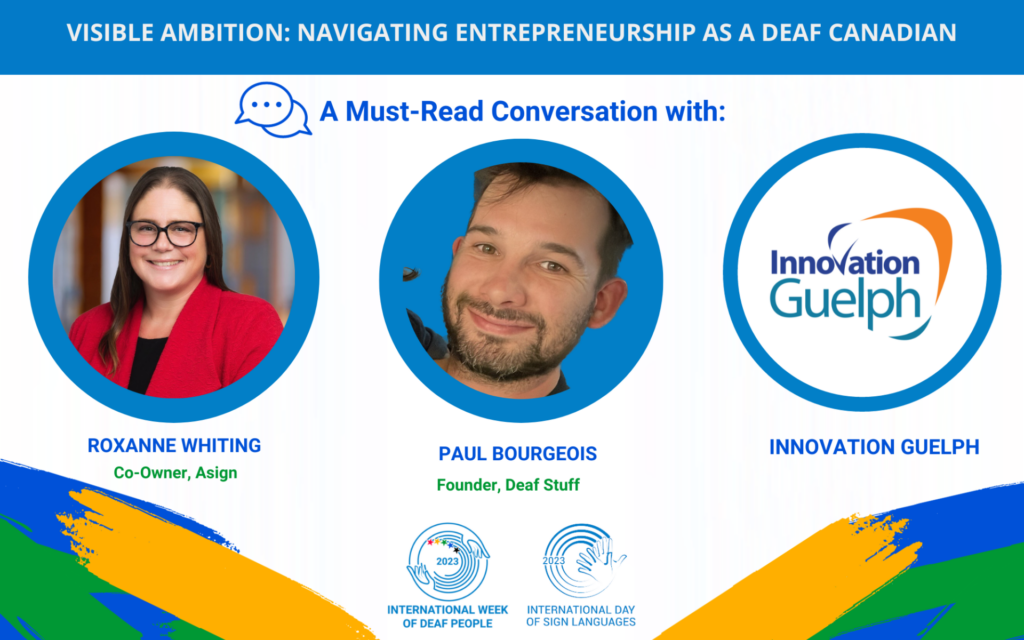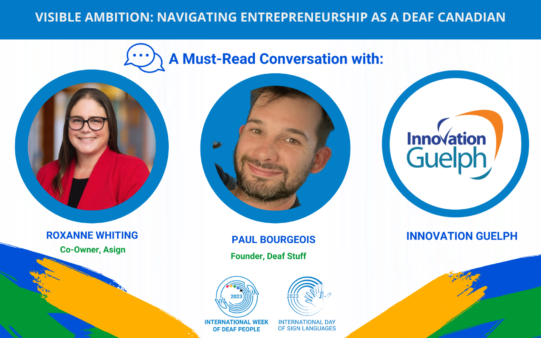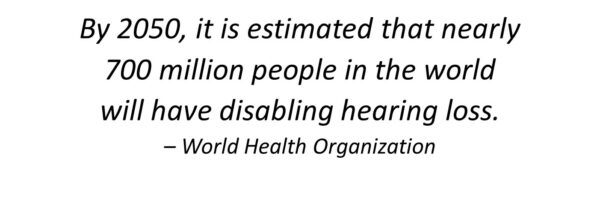Home » Visible Ambition: Navigating Entrepreneurship as a Deaf Canadian
Visible Ambition: Navigating Entrepreneurship as a Deaf Canadian

A Conversation between Paul Bourgeois (Founder, Deaf Stuff), Roxanne Whiting (Co-owner, Asign) and Innovation Guelph.

I. King Jordan, who became the first Deaf president of Gallaudet University, once made a profound statement that highlights the capabilities of deaf individuals. He said, “Deaf people can do anything hearing people can do except hear.” This quote is memorable because it came after the successful Deaf President Now protest of 1988, a significant turning point in the university’s history. The protest was aimed at achieving equal opportunities for deaf people in education and breaking down the barriers that have long prevented them from reaching their full potential.
Although strides have been made towards inclusivity, the Deaf community must still confront various obstacles in today’s world. These challenges range from a lack of access to crucial communication tools and services to a lack of understanding and awareness from people who don’t experience deafness. As a result, it is vital to continue working towards creating a more supportive environment for deaf individuals, one in which they can thrive and achieve their full potential, be that a teacher, a rocket scientist, a construction worker, or yes, even an entrepreneur.
Innovation Guelph recently sat down with Roxanne Whiting, co-owner of Asign, a Canadian company that connects people through sign language, and Paul Bourgeois, founder of an online clothing store, Deaf Stuff and full-time translator, to discuss the importance of the International Week of the Deaf and how Deaf Canadian entrepreneurs can best navigate the road to success.

Before engaging in the interview, it was essential to understand what sign language is and its history here in Canada. It was explained that we do not have a universal “Canadian” sign language. In the 19th century, Deaf immigrants brought their sign languages to Canada and Langue des Signes Française (LSF) was introduced to Deaf students. As English and LSF were used side by side, the Deaf community witnessed the gradual development and transformation of American Sign Language (ASL) into the rich and expressive language it is today.
Most culturally Deaf anglophone Canadians use ASL, while francophone Deaf people prefer Langue des Signes Québécoise (LSQ). ASL and LSQ have regional variations, commonly called “dialects” or “accents.” As of 2019, American Sign Language, Langue des Signes Québécoise, and Indigenous Sign Languages are all recognized as the primary languages for communication by Deaf persons in Canada. The World Federation of the Deaf (WFD) is urging governments worldwide to take action to ensure that at least half of their children and young people are proficient in their national sign language. This is a crucial step towards creating inclusive societies where deaf individuals can communicate freely and comfortably in any setting.
With the upcoming national rollout of the Accessible Canada Act (ACA), The Federal Government of Canada stated, “The Deaf community, or people who use sign language as their main method of communication, does not always have access to sign language interpretation. The demand for sign language interpretation is increasing with the Accessible Canada Act, as it requires more programs and services to be accessible.” [i] Removing accessibility barriers and establishing standards for all must be developed and followed on or before January 1, 2040.
Provincially, in Ontario, “Under the Accessibility for Ontarians with Disabilities Act (AODA), the government is responsible for creating accessibility standards that organizations must follow. Implementing and enforcing these standards will help us work together to make Ontario more accessible and inclusive by 2025.” [ii] Accessibility standards are laws governments, businesses, non-profits, and public sector organizations must follow to be more accessible.
Now armed with a greater understanding of history and policy, we were better situated to discuss language, education, accessibility, and support services for budding entrepreneurs with Roxanne and Paul.
The Interview
Both Roxanne and Paul are business owners with ties to the Deaf Community. Roxanne, born a CODA (Child of Deaf Adults), lived a life immersed in the Deaf culture. She observed the roadblocks through her family’s eyes. As one of Canada’s only CODA-owned business leaders in the translation/interpretation space, Roxanne has dedicated her life to helping remove those barriers and empower the Deaf Community.
Growing up Deaf with Deaf parents, Paul naturally learned American Sign Language (ASL) as his first language. He has always embraced his identity and used his strong connection to the Deaf community to create opportunities for himself and others. These experiences have shaped him into a passionate advocate for Deaf rights and inclusion, a patient and loving father, an understanding ASL teacher, and a successful entrepreneur. Paul’s journey is a testament to the power of perseverance, self-discovery, and the transformative impact of embracing one’s unique identity.
Paul’s entrepreneurial journey began when he joined a few small startups within the Deaf Community. Even though these ventures didn’t work out, Paul learned a lot from these experiences and never stopped growing or wanting to be in business for himself.
As a fully bilingual individual (ASL & English) with big goals for running his own company, he eventually decided on a solo venture called “Super Deaf Apparel,” later rebranding to “Deaf Stuff” in 2017. Deaf Stuff is an e-commerce-based clothing/apparel company focused on Deaf Culture. “The Deaf community is an invisible minority in public. You wouldn’t know right away if any stranger can communicate in sign language, much less if they are deaf, in public. Deaf Stuff aims to make the Deaf community visible, with style,” explains Paul.
Paul started his business around the same time he secured a summer job as a student marketer for Asign (previously known as SLIAO). Impressing those he worked with, Paul was given the opportunity to continue working at Asign. Since that summer, he has gotten to interpret, translate and even coach actors in American Sign Language (ASL) for some big-name Netflix and CBC shows. As a dedicated and hardworking individual, Paul now works full-time as an ASL translator for Asign, teaches an ASL class at Carleton University and manages Deaf Stuff part-time while raising a 14-month-old CODA toddler.

Paul overcame several challenges throughout his entrepreneurial journey, much like other Deaf individuals who aspire to follow their dreams. Unfortunately, the COVID-19 pandemic was one of the most significant obstacles faced by the Deaf Community. Much of the business for any startup comes from exposure at tradeshows and expos. Due to the lack of live, in-person events, networking opportunities and support within the Deaf Community, Deaf entrepreneurs faced significant stagnation in sales growth. Since showcasing products at Deaf Expos is crucial for Deaf Stuff’s business, Paul’s sales reached a standstill. And he wasn’t alone. Deaf Expos are critical resources for Deaf entrepreneurs, but many, like Paul, faced challenges during the pandemic due to having no alternatives.
Roxanne validated that Paul is not alone in his struggle to find resources as both an entrepreneur and a Deaf person. In fact, Ontario NDP MPP Chris Glover (Spadina – Fort York) mentioned recently that, “there are 150,000 Ontarians who are Deaf, part of a global community of 70 million Deaf individuals who use sign languages and services.” It is estimated that by 2050, nearly 700 million people globally will have disabling hearing loss.[iii] These people are incredibly underserved when it comes to resources that are available and accessible to them. “There are lots of Facebook and LinkedIn groups for Deaf professionals, but reaching out to hearing organizations for support can be a big challenge because every time a Deaf entrepreneur goes, they have to explain their culture, they have to fight for access, and that is a barrier,” Roxanne says. The educational gap for Deaf individuals is a significant issue. Roxanne points out that the hearing community gains knowledge by listening to others and overhearing conversations about resources they might need for personal use and their business. Unfortunately, Deaf individuals need visual resources to acquire similar knowledge, which is often overlooked when creating learning materials and resources.

In Canada, there are no post-secondary schools exclusively for Deaf students, making it challenging for them to pursue further education. Additionally, attending Gallaudet University in the United States of America is not a viable option for many Deaf individuals due to the high costs involved. As a result, many Deaf people are left with limited opportunities to continue their education. Several in the Deaf Community struggle financially and live below the poverty line. The AODA does not yet have an education standard in place. While Canadian Colleges and Universities supply ASL interpreters and communication supports, limited options exist[iv]. With more sign language interpreters in our schools, more Deaf children would have better career options.
Paul stated that a massive barrier to Deaf people becoming entrepreneurs is the lack of available education and resources often found at Accelerators and Incubators across Canada. The cost and availability of bilingual courses and workshops hinder much of their knowledge and business acumen. While some organizations, like Innovation Guelph, offer free entrepreneurial workshops live interpreted to ASL, most do not. Although the workshops offered by Innovation Guelph are very beneficial, he mentioned they are still aimed at hearing individuals, and some of the content is not as relevant to, or is hard to navigate, for some in the Deaf community. Ideally, he would love to see entrepreneurial workshops and education done strictly in sign language to help Deaf individuals navigate the daily ups and downs they experience that are unique to their community. He adds that even when resources do exist, they are often not shared in an accessible way, which leads to Deaf entrepreneurs needing to do extra research to find what they need. He says, “That time factor is hugely all-consuming. We must look for resources, find resources that are accessible in ASL, watch them if they have been interpreted or translated, and then give thought to that. So, if we can figure out a way to give people exactly what they need (from the start), that would ease a huge challenge,” he explains.
Paul explained that Deaf entrepreneurs often face the challenge of finding their own resources at a moment’s notice, instead of having them readily accessible. For example, if a Deaf person needs to go to the bank or attend a training session at a business accelerator, they will have to book an interpreter or bring a family member along. This puts a significant amount of responsibility on the Deaf entrepreneur. However, if facilities and organizations provided Video Remote Interpreting on-demand (VRI OD), it would remove the onus on the Deaf person to request an interpreter in advance. Having accessibility built-in with tools like Asign’s VRI OD means that communication access is not a barrier, making it easier for Deaf entrepreneurs to access the necessary resources. By funding these solutions, we can do more to support the Deaf entrepreneurial community.
Language barriers pose a significant challenge for Deaf entrepreneurs, preventing them from accessing the resources they need to succeed. With adequate funding, this barrier can be removed by providing language interpretation services that allow Deaf entrepreneurs to more effectively communicate their ideas and access the support they need to thrive. This will result in a more diverse and inclusive entrepreneurial ecosystem, allowing more individuals to bring their innovative ideas to life. Paul explained the funding for accessibility and interpreters is beginning to improve because of the ACA. Still, he fears it will be a considerable amount of time before we see the results. Roxanne added “the government is trying to provide more resources and guidance through the ACA, so we’re on the road to getting there, but it feels like (it’s been) a long time,” she explained.

So, what can companies, accelerators, and support organizations do to help? “Companies have to make sure they are thinking about if their webpages for resources are accessible, and whether Deaf people are actually going and accessing these services. Seeing ASL on a website makes this information much easier to consume and ensures the entrepreneurs know exactly what to do,” explained Paul.
There are many online groups and events (for example, the Deaf Expos and Facebook groups) hearing individuals can join and attend. Sending resources directly to Deaf Facebook and LinkedIn groups and attending Deaf Expos to support the community will help teach what is needed and how you can help. When companies reach out directly to these Deaf organizations and groups, it shifts the responsibility to the corporations instead of the Deaf entrepreneurs. By doing so it removes access-to-information barriers for the entrepreneurs.
Roxanne added (hearing) companies need to factor accessibility into their budgets. “I’m really hoping to see more organizations take the step forward, offer accessibility, and we will see those doors start to open more,” she says.
The Canadian Association for the Deaf states: “The Sign Languages of Deaf people are true languages and must be given the same status and respect as any other language.” The road to change starts with each one of us. By prioritizing accessibility and inclusion, we can work together to create a more equitable society where everyone has an equal opportunity to thrive.
_______________________________________________
[I] https://www.canada.ca/en/employment-social-development/programs/accessible-canada/act-summary.html
[ii] https://www.ontario.ca/page/about-accessibility-laws
[iii] https://www.who.int/news-room/fact-sheets/detail/deafness-and-hearing-loss
[iv] https://www.aoda.ca/sign-language-interpreters-in-schools/
_______________________________________________
About Asign: Asign is a certified woman-owned and led business accredited by WBE Canada and WEConnect International. Their mission is to connect people, ideas, and communities through sign language. In 1997, they started offering high-quality interpreting services as Sign Language Interpreting Associates Ottawa (SLIAO), determined to provide better opportunities for entrepreneurs and better access for the Deaf community. Today, they continue their legacy under the rebranded name of Asign and are more committed than ever to providing equal communication access to everyone. Their VRI OD systems are
About Deaf Stuff: Deaf Stuff is a Deaf-owned apparel brand that creates maximum-visibility products, including hoodies, backpacks, hats, pants and more. Their purpose is to provide visibility and connection to the Deaf community. The Founder and CEO of Deaf Stuff, Paul Bourgeois, also provides a range of professional ASL services, including consulting, coaching, translation, and transcription.
About Innovation Guelph: As an award-winning Regional Innovation Centre in Ontario, Innovation Guelph (IG) supports the growth and prosperity of scalable companies across Canada. Their unique programs provide founders with education, mentoring, strategic introductions, networking, and consultative expertise to help their companies thrive. With a team of over 60 industry experts and entrepreneurial staff members, IG offers unparalleled access to diverse expertise to enhance companies’ profitability, sustainability, and strategy. They work closely with companies to identify the necessary steps for scaling and provide specialized sector experience in advanced manufacturing, clean/green technology, agri-innovation (including food and beverage processing), and classic technology. All Toolkit Tuesday webinars are currently offered in both English and ASL.
If interested, you can catch Deaf Stuff at the Ottawa Deaf Expo 2023 in Nepean Sportsplex, Ottawa, Ontario, on Saturday, September 23, 2023, between 10 AM & 5 PM.
For inquiries, reach out to [email protected]
Boundless Accelerator
https://boundlessaccelerator.ca/
Boundless Accelerator™ offers unique programs and initiatives to support businesses from startup to scaleup for a strong, diverse, inclusive, sustainable economy. Since our inception in 2011 as Innovation Guelph, our award-winning programs have grown to serve 1,400+ entrepreneurs across Ontario and Canada who are building a strong, inclusive, equitable and sustainable economy. Accolades for our work include the University of Guelph’s Gordon S. Lang HeForShe Impact Award, the National Enterprise Support of the Year Award and the CANIE Enterprise Support of the Year award for advancing Canadian entrepreneurship through leadership and impact. Most recently, the Technology Councils of North America (TECNA) Innovation Awards recognized our i.d.e.a. Fund program for Innovation in Diversity, Equity & Inclusion. Boundless Accelerator™ connects entrepreneurs with Regional Innovation Centres in Ontario for additional resources and strives to partner with like-minded organizations across Canada to further support and guide our clients to success. Based in Guelph, Ontario, we are in the heart of the Toronto-Waterloo Innovation Corridor, striving to create a future where entrepreneurship knows no limits.


